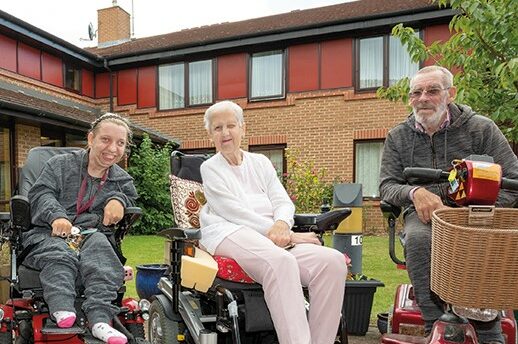
House meeting
In February 2021, the Commission on the Role of Housing in the Future of Care and Support published its first report – a policy discussion paper outlining the major issues facing the sector and setting out a vision for a better future, with some preliminary proposals the Commission had been exploring as part of the second phase.
Included in our scope are all types of housing facilitating care and support, including care homes, retirement communities, sheltered housing, supported living and shared lives.
Our aim is to produce a roadmap to set out, not only where we as a sector would like to go, but how we can get there. The roadmap draws on appreciative inquiry, which is a strengths-based approach for envisioning a positive future and building on the best aspects of the present to achieve it.
We’re essentially asking:
- What is currently working well, what matters and why?
- How do we want things to be?
- How can we work together to make it happen?
- What can we put in place to make it happen more of the time?

Collective endeavour
Central to the Commission is the belief everyone is part of the ‘how’. From central government, to local authorities, from commissioners and providers, to care staff and the people who deserve the widest range of housing options to support them to live their best lives.
As part of this appreciative journey, we have identified over 50 examples of positive practice across seven ‘areas of excellence’. These include efforts to improve outcomes, promote independence, provide person-centred care and reduce isolation.
Other areas identified include the benefits of being involved with local communities, family and friends, not least the boost to local economies. Attendant to this is the promotion of equality, inclusion of BAME and LGBTQ people, as well as people with disabilities. Co-production, innovation, including digital technologies enabling choice and control, also feature prominently.

Sharing excellence
We think examples like these are essential to highlight what is already working, in order to start thinking about how we can make this happen more often, across the country. Here we have highlighted just a few of them:
Silverlinks promotes choice and control with a series of networks of mutual support, whereby older volunteers share their personal housing experiences, offer one to one help, as well as provide information and advice to other older people.
Habinteg Housing Association, which provides high quality homes for disabled people in integrated, multigenerational environments. Tenants are encouraged to be involved in decision making within the organisation. This includes the scrutiny panel and insight group, which gives them the opportunity to set standards and influence decisions which have an impact locally, nationally and across the organisation.
Clare Court (an Avery Care Homes residence) is a residential, dementia and nursing care home for older adults in a diverse area of Birmingham.
They demonstrate careful consideration of how ethnicity, background and faith impact on all aspect of residents’ lives and support them to maintain these connections. They have an outreach programme across communities, staff who speak a wide range of languages, culturally diverse dining choices, visits out to local communities, and a recruitment and retention plan focusing on the values and behaviours of staff.
As part of the Commission, these examples as well as eight detailed case studies will be published on SCIE's website as part of a searchable ‘directory of promising practice’. They include examples across different models of housing that facilitate care and support as well as international examples. This will both help set out the roadmap for the Commission and be a helpful resource for the wider sector.
2 comments
Comment by R J posted on
You start with *everyone is different in myriad ways*.
That means what suits one person may well be hell for another person who appears to be broadly similar.
You don't assume things based on the current situation [financial, family, whatever] and 'apparent' capacity of the individual.
Disability is only one variable and it doesn't mean you will *get on well* with another disabled person - you may BUT you may not.
And a whole lot more - but you won't take any notice anyhow - it's just a token exercise. Done far too many of these over the last 36 years regarding learning disabilities.
Comment by sandra bentley posted on
WHilst i am disabled everyone is individual I struggle with the title of the report - Older adults ! firstly the report covers people of all ages if you are to include those needing supported living & those with a disability. I am 57 not old in my outlook, I do not want to live in a flat or offered temporary housing in a retirement home. We need proper homes for people. Habinteg is one of a handful of companies helping to build purpose built housing in communities made up of people of various ages.